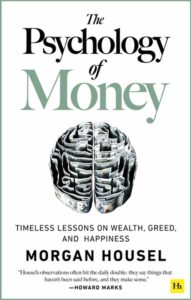
Page 2
Premise of this book is that doing well with money has a little to do with how smart you are and a lot to do with how you behave. And behavior is hard to teach, even to really smart people.
Page 7
History never repeats itself; man always does.
Page 12
Your personal experience with money make up maybe 0.000000001% of what’s happened in the work, but maybe 80% of how you think the world works.
Page 14
If you grew up when inflation was high, you invested less of your money in bonds later in life compared to those who grew up when inflation was low. If you happen to grow up when the stock market was strong, you invested more of your money in stocks later in life compared to those who grew up when stocks were weak.
Page 18
Every financial decision a person makes, makes sense to them in that moment and checks the boxes they need to check.
Page 20
Before World War II most Americans worked until they died.
Page 34
When things are going extremely well, realize it’s not as good as you think. You are not invincible, and if you acknowledge that luck brought you success then you have to believe in luck’s cousin, risk, which can turn your story around just as quickly.
But the same is true in the other direction.
Failure can be a lousy teacher, because it seduces smart people into thinking their decisions were terrible when sometimes they just reflect the unforgiving realities of risk. The trick when dealing with failure is arranging your financial life in a way that a bad investment here and a missed financial goal there won’t wipe you out so you can keep playing until the odds fall in your favor.
Page 62
“Charlie and I always knew that we would become incredibly wealthy. We were not in a hurry to get wealthy; we know it would happen. Rick was just as smart as us, but he was in a hurry.” – Warren Buffett.
Page 84
More than your salary. More than the size of your house. More than the prestige of your job. Control over doing what you wan, when you want to, with the people you want to, is the broadest lifestyle variable that makes people happy.
Page 85
On my first day I realized why investment bankers make a lot of money: They work longer and more controlled hours than I knew humans could handle. Actually, most can’t handle it. Going home before midnight was considered a luxury, and there was a saying in the office: “If you don’t come to work on Saturday, don’t bother coming back on Sunday.” The job was intellectually stimulating, paid well, and made me feel important. But every waking second of my time became a slave to my boss’s demands, which was enough to turn it into one of the most miserable experiences of my life. It was a four-month internship. I lasted a month.
Page 106
One of the most effective way to increase your saving isn’t to raise your income. It’s to raise your humility.
Page 186
Growth is driven by compounding, which always takes time. Destruction is driven by single points of failure, which can happen in seconds, and loss of confidence, which can happen in an instant.
Page 208
Become OK with a lot of things going wrong. You can be wrong half the time and still make a fortune.
Page 217
The independent feeling I get from owning our house outright far exceeds the known financial gain I’d get from leveraging our assets with a cheap mortgage.
Page 217
Good decisions aren’t always rational. At some point you have to choose between being happy or being “right”.